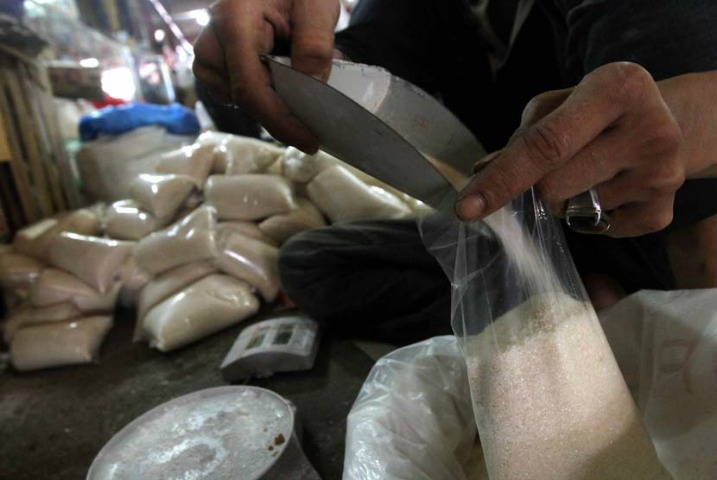
Is a transaction for the need of the church lawful in shari’a?
Question no.1:
What is the ruling for selling daily needs, products such as knife, table, lamp, etc., while we know exactly that the buyer is liquor factory, or a church, or a bank that practicing usury, (such as selling papers to print the billing, the vendor machine, computer), etc… Where, if we used the principle of the knife seller, we do not know for what that knife will be used and that is alright; but in a big company, the customers data will be obtained and it will be evident who they are, and what are their occupations. Such as a material store that sells bricks to the construction of a church (the company surely know about this because the bricks will be delivered to the church and used to construct it.)
***
Question no.2:
All praises be to Allah, my company do not sell an ordered base software, but a built-in software (ready to use software), but in fact there are still some churches and christian schools and usury-based institutions that are attracted to buy it. They simply buy it without asking for additional feature or modification.
Also about the pedicab driver or taxi driver that carry passengers, who want to be taken to the church. What should they do, take it or not?
The point is, are we totally disallowed to have financial transaction with them, or there are still fields where we are allowed to transact with them, as long as the sold products are not the central point of their activities?
Answer:
All praises be to Allah, peace and prayer of Allah be upon Prophet Muhammad, his family, and his companions.
The main point of the question here has no difference from the previous answer. Because the basis of it is the principle of disallowance of helping each other in mischief. Undoubtedly, creating a relation that directly gives positive contribution to the contemptible deed, whether in trading, renting, or other forms, is contradicting this principle.
Below I post an answer of Al Lajnah Ad Da’imah Lil Ifta’, Kingdom of Saudi Arabia, that contains similar point with your question above:
الفتوى رقم 20507
س: لدينا عمارة في موقع ممتاز، وعلى أفضل الشوارع في مدينة الطائف بحمد الله، والآن يتردد علينا مدير البنك السعودي البريطاني، وذلك لاستئجار المعارض التي تحت هذه العمارة لجعل الفرع الرئيس للبنك بالطائف بها، بمبلغ مغر جدا، ولمدة عشر سنوات، وسوف يدفع خمس سنوات مقدما، ونحن -أصحاب العمارة- في حاجة ماسة إلى السيولة في الوقت الحاضر لسداد بعض الديون التي ترتبت على هذه العمارة، وديون أخرى للغير أحرجنا منهم من كثرة ترددهم علينا، البعض منا يريد تأجيرها على البنك لسداد تلك الديون، والبنك إثمه عليه، ولا إثم علينا؛ لأننا لم نتعامل معه بالربا، ولا مع غيره بحمد الله، وهو مستأجر كغيره من المستأجرين. والبعض منا يقول: إن في ذلك إثما من باب: (وَلَا تَعَاوَنُوا عَلَى الْإِثْمِ وَالْعُدْوَانِ) سورة المائدة الآية 2 والآن نحن في حيرة من أمرنا، أفتونا مأجورين. هل نؤجر على البنك وإثمه عليه، أم نحن أصحاب العمارة آثمون إذا أجرنا عليه تلك المعارض؟ حتى نتمكن من الرد على البنك المستعجل على إجابتنا.
ج: لا يجوز تأجير المحلات للبنوك؛ لأنها تتخذها محلات للتعامل بالربا، وقد لعن رسول الله -صلى الله عليه وسلم- آكل الربا وموكله وشاهديه وكاتبه. والمؤجر يدخل في ذلك؛ لأنه أعان على أكل الربا بأخذ الأجرة في مقابل ذلك، والله تعالى يقول: (وَلَا تَعَاوَنُوا عَلَى الْإِثْمِ وَالْعُدْوَانِ وَاتَّقُوا اللَّهَ إِنَّ اللَّهَ شَدِيدُ الْعِقَابِ) سورة المائدة الآية 2، وفي الحلال غنية عن الحرام. وقد قال الله سبحانه: (وَمَنْ يَتَّقِ اللَّهَ يَجْعَلْ لَهُ مَخْرَجًا وَيَرْزُقْهُ مِنْ حَيْثُ لَا يَحْتَسِبُ ) سورة الطلاق الآية 2-3
وبالله التوفيق، وصلى الله على نبينا محمد وآله وصحبه وسلم.
اللجنة الدائمة للبحوث العلمية والإفتاء
عضو … عضو … عضو … نائب الرئيس … الرئيس
بكر أبو زيد … صالح الفوزان … عبد الله بن غديان … عبد العزيز آل الشيخ … عبد العزيز بن عبد الله بن باز
Fatwa no: 20507
[Question]
“All praises be to Allah, we (a partnering group) have a building in a strategic place, on the best road too. And now the director of Saudi British Bank keeps on coming to us to rent the storehouse that located on the lower part of that building, as the main branch office of that bank in the city of Thaif. He offers a very nice price for 10 years time, with requirement that the price of the first five years will be paid in advance. Now, we; the owner of that building are in the need of money to settle our debts during the construction of this building and other debts as well. We’re currently feeling awkward when we have to face the creditor, because they have asked us many times to settle our debt. Half of us
want that the building being rented to that bank, so that we’ll be able to settle our debts. They said that the sin of the bank is the burden of the bank manager, while we will not join him in it; since we, all praises be to Allah- do not make any usury contract, whether with the bank or other institutions. And the status of that bank is as a renter, just as any other renter.
But the others argue that: renting the building to bank is a sin, because it included in Allah’s decree:
وَلَا تَعَاوَنُوا عَلَى الْإِثْمِ وَالْعُدْوَانِ. المائدة 2
“and do not help one another in sin and transgression.” (Qs. Al Maidah/The Table Spread: 2)
And now we’re all confuse, thus we ask you to issue a fatwa for us, may Allah bestow upon you plenty of rewards: Is it permissible for us to rent the store to the bank and the sin will be burdened to them only? Or are we going to be burdened as well, if we rent it to the bank? Please answer this question immediately so that we’ll give our answer to the bank based on your fatwa.
[Answer]
It is not allowed for you to rent the store to the bank, since they’ll turn it to a place where usury is being practiced inside it. Because the Messenger of Allah -peace and prayer of Allah be upon him- has cursed the usurer, the giver of the usury. the two witnesses, and the scriber. (Narrated by Ahmad, Abu Dawud, An Nasai, Ibn Maja, ad Darimi).
And people who rent the building for it is included in this hadith. because they have supported the existence of usury by renting their building to the bank, while Allah decreed,
وَلَا تَعَاوَنُوا عَلَى الْإِثْمِ وَالْعُدْوَانِ وَاتَّقُوا اللَّهَ إِنَّ اللَّهَ شَدِيدُ الْعِقَابِ
“And do not help one another in sin and transgression.” (Qs. Al Maidah/The Table Spread: 2)
And there are many doors to the legal earnings, thus there are no more reasons to take have the illegal one.
And Allah the Exalted also decreed:
وَمَنْ يَتَّقِ اللَّهَ يَجْعَلْ لَهُ مَخْرَجًا وَيَرْزُقْهُ مِنْ حَيْثُ لَا يَحْتَسِبُ
“Allah will find a way out for him who fears Allah, and will provide him sustenance from whence he never even imagined.” (Qs. At Thalaq/The Divorce: 2-3)
And with Allah is the guidance, peace and prayer of Allah be upon Prophet Muhammad, his family, and his companions.
Members of the Standing Committee of Scientific Research and Fatwa
Chief: Abdul Aziz bin Abdillah bin Baz
Vice chief: Abdul Aziz Alus Sheikh
Member: Bakr Abu Zaid
Member: Shaleh Fauzan
Member: Abdullah Ghudaiyyan
[][][]
Intentions in Social Interactions
A good intention isn’t enough to make a deed as a good deed in shari’a. The hindus, Buddhas, and Christian also have good intention when they worshipped their gods. But it is not enough, thus they are still categorized as infidel, and later in the Hereafter, will be the dwellers of the Hell.
In social interaction, a good intention is also not enough, rather it should be followed by a correct deed too. Here is the description: An intentionally good man tries to ease other people’s affairs, but by receiving bribe. All agree that an authority that accepts bribe has committed a crime, although his intention was good, to ease other people’ affairs and to fulfill the need of his family, and other good intentions that he might have. This practice is evidently transgress the shari’a laws, and it might disadvantage others. The same goes for selling things to the church: It against the shari’a laws because it helps them to commit wrongdoings and it’ll disadvantage other muslims. Because it is possible that for now their activities are merely internal ones, but they’ll able to conduct it, thus their presence will surely upset the faithful muslims. Moreover, it is already proven that the church always try to spread their infidelity and wrong belief to muslims. Thus, a faithful man in Allah and the Last Day should not be indifferent in facing the misdeeds and infidelity around him.
Why don’t we be more dignified, by actively enjoin people to Islam and try to create a pressure or create a certain condition (good condition) so that the followers of other religion will be lured to embrace Islam, or minimally, caused them to leave their religion.
Isn’t the hadith below enough to motivate us to do something?
عَجِبَ اللَّهُ مِنْ قَوْمٍ يَدْخُلُونَ الْجَنَّةَ فِى السَّلاَسِلِ. رواه البخاري
“Allah amazed with the people who entered the Paradise in chained condition.” (Narrated y Bukhari)
And in another narration it is said that,
لَقَدْ عَجِبَ رَبُّنَا عَزَّ وَجَلَّ مِنْ قَوْمٍ يُقَادُونَ إِلَى الْجَنَّةِ فِى السَّلاَسِلِ. رواه أحمد وأبو داود
“Indeed, Allah amazed by the people whom are being pulled to enter the Paradise with chain.” (Narrated by Ahmad and Abu Dawud)
Brother! Don’t you feel that you’re being called to be a part of those who pull some people to Paradise by chain? Create such condition in your society, so that willing or not, aware or not, they’ll embrace Islam, worship Allah, obey His commands, and leaving the wrongdoing.
Good luck and may you be the motivator of the nation to enter the Paradise, whether they are willing to, or by a steel chain.
Ustadz Dr. Muhammad Arifin Badri, M.A.
Article of www.syaria.com

